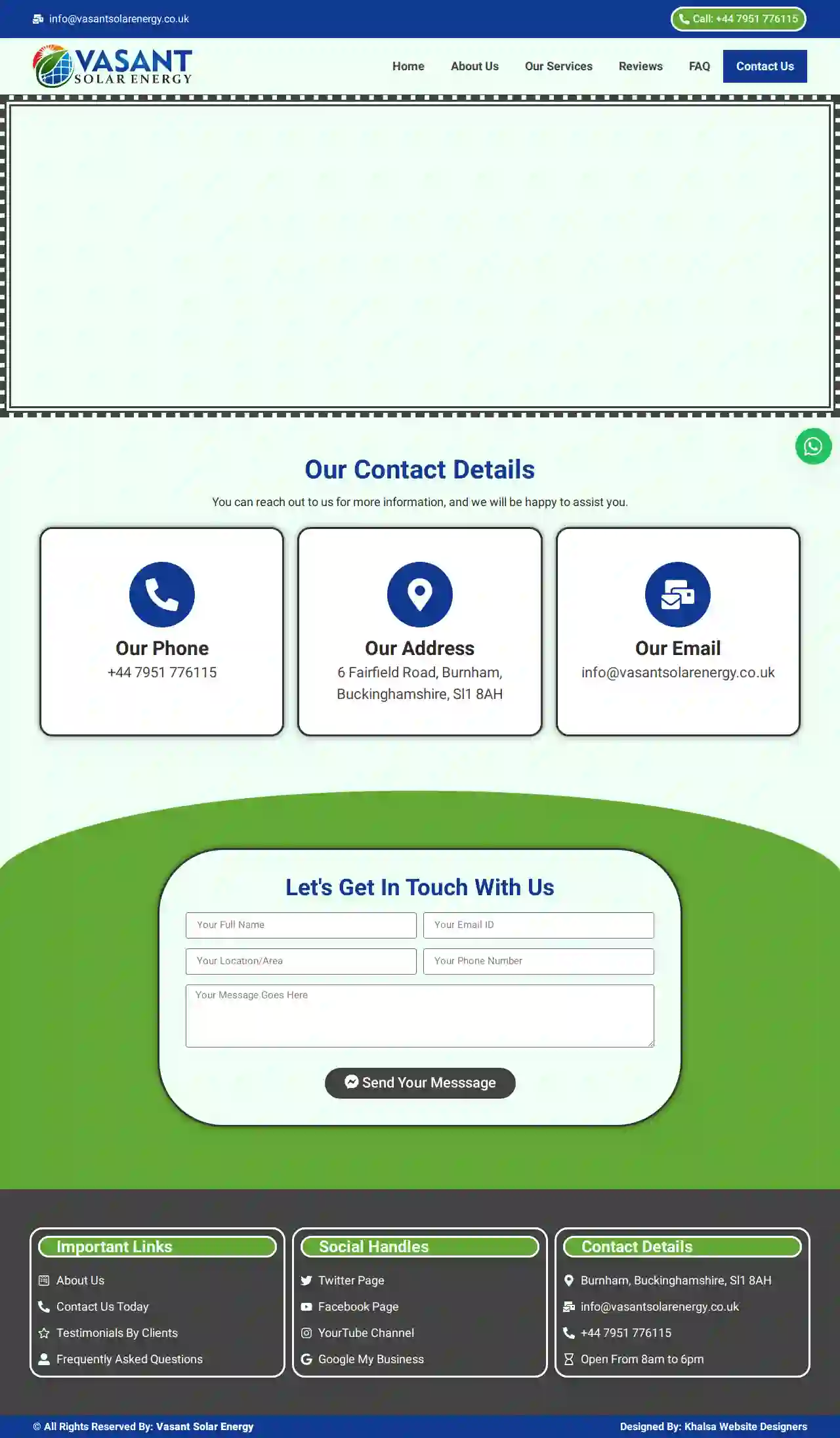Solar Panel Repair & Maintenance High Wycombe
Top 10 Solar Panel Maintenance & Repair in High Wycombe
Receive up to 3 Solar Panel Troubleshooting quotes for your project today! Compare profiles, reviews, accreditations, portfolio, etc... and choose the best service.

Solar Dock
52 reviews123 High Street, Brighton, BN1 1AA, GBSolar Dock is a leading provider of solar panel installation and maintenance services in the UK. With years of experience in the industry, we have a proven track record of delivering high-quality, reliable solutions to both residential and commercial clients. Our team of expert engineers is dedicated to providing exceptional customer service and ensuring that your solar energy system is installed and maintained to the highest standards. We offer a comprehensive range of services, including: Solar panel installation Solar panel maintenance Solar panel repair Solar energy system design Battery storage solutions At Solar Dock, we are committed to providing our clients with the best possible solar energy solutions. We use only the highest quality materials and equipment, and our team is always up-to-date on the latest industry trends. We are also fully insured and accredited, so you can be confident that you are in good hands. Contact us today to learn more about how we can help you save money on your energy bills and reduce your carbon footprint.
- Services
- Why Us?
- Accreditations
- Our Team
- Testimonials
Get Quote
Schletter UK
1Aylesbury, GBAt Schletter, we believe that every enterprise, big or small, can benefit from passionate support. And if ever there were an industry worth supporting, it's solar. That's why we're dedicated to the success of every solar company, including yours. We provide products engineered to ensure the success of your projects, projects that will change our lives and the planet for the better. We've installed over 55 GWp of systems worldwide, secured over 105 global patents, and offer 580 products for all your solar mounting needs. With 800 employees and 40 million Schletter roof hooks installed, we're committed to making a difference. We're present in over 100 countries and are constantly striving to improve and innovate.
- Services
- Why Us?
- Gallery
Get Quote
Solar Services Solutions
4.610 reviewsBuckingham, GBSolar Services Solutions is a leading provider of renewable energy solutions in Berkshire & Buckinghamshire, Oxfordshire, Surrey, London, Hampshire, Hertfordshire, and Wiltshire. With a team of experienced and qualified professionals, we offer bespoke solutions for residential and commercial properties. Our services include solar panels, solar thermal, air source heat pumps, ground source heat pumps, EV chargers, and energy storage. We pride ourselves on our honest and transparent approach, providing expert technical advice and answering any questions. Our mission is to help our customers save money on energy bills and contribute to a greener, sustainable way of living. With over 15 years of experience, we have established ourselves as a trusted and reliable partner for all your renewable energy needs.
- Services
- Why Us?
- Accreditations
- Our Team
- Testimonials
- Gallery
Get Quote
Anglo Solar
1Globe Park, Third Avenue Jubilee, Marlow, SL7 1EY, GBAnglo Solar is an open and approachable British company based near London, and we’re always delighted to field enquiries from potential partners and distributors worldwide. Whether you have specific technical questions regarding our solar PV modules or want to discuss the benefits of working with us in more detail, our team is ready for your call. Anglo Solar is a British solar brand owned by Global PV Sales Ltd.
- Services
- Why Us?
- Accreditations
- Gallery
Get Quote
Solarbility
4.97 reviews33 Dedmere Court, Marlow, SL7 1PL, GBIndependent experts in Solar Panel installations and Battery Storage systems. Helping home owners, new build developers and businesses save money and create a greener future for all. Learn More SERVICES Who we help Home Owners We're dedicated to finding the right system for your household and will support you every step of the way, from design to installation. New Build Our experienced team understand your requirements at each stage of your project. We supply expert design, smooth project management and competitive pricing. Business With the Government offering 50% tax breaks for businesses, installing a solar system is a great way to create efficiencies. Our team are on hand to help scope and design your project. ABOUT What makes us different? Solarbility are UK experts in solar panels and battery storage solutions. We help homeowners, new build developers and business save money from their electricity bills and create a greener future for all with solar power. We supply and install the best solar products including car chargers, protection for photovoltaic panels and accessories. We are a family run business, dedicated to excellent customer service and satisfaction. We listen to your requirements and create bespoke solar array designs and a comprehensive quotation with no hidden costs. We are MCS accredited Solar PV installers and provide full customer protection through RECC, MCS, Napit & CHAS, and you can read many happy customer reviews on google and checkatrade. Solar power costs for home owners has never been cheaper so you can start saving immediately.
- Services
- Why Us?
- Accreditations
- Our Team
- Testimonials
- Gallery
Get Quote
Solar Clear UK Ltd
4.816 reviewsVerna House, 9 Bicester Road, Aylesbury, HP19 9AG, GBWe keep green energy clean Solar Clear UK Ltd provide specialist cleaning and maintenance for solar panels for both commercial and domestic customers. A specialist cleaning and maintenance company, with a qualified team, and accredited to the latest health and safety standards. Based in the heart of Aylesbury Vale in Buckinghamshire, Solar Clear are perfectly based to offer a nationwide Solar Panel Cleaning service, with no expense spared on our high quality specialist cleaning equipment, we offer bespoke services to commercial and domestic customers. With dedicated hard work we are proud to have a solid company with hundreds of satisfied customers, both new and existing. Contact Us
- Services
- Why Us?
- Accreditations
- Our Team
- Testimonials
- Gallery
Get Quote
solar and heating ltd
52 reviewsUnit 1, 100-102 High Street, Birmingham, B31 2AA, GBSolar & Heating are a family-run business based in the heart of the UK. We have been providing high-quality solar panel installations and heating solutions for over 15 years. Our team of experienced engineers are dedicated to providing our customers with the best possible service and advice. We offer a wide range of products and services to meet the needs of all our customers, from small domestic installations to large commercial projects. We are committed to providing our customers with the most efficient and cost-effective solutions available. We are also fully accredited and insured, giving you peace of mind that you are in safe hands. At Solar & Heating, we believe that everyone should have access to clean, renewable energy. We are passionate about helping our customers reduce their carbon footprint and save money on their energy bills. We offer a free, no-obligation consultation to discuss your needs and find the best solution for you. Contact us today to learn more about how we can help you.
- Services
- Why Us?
- Accreditations
- Our Team
- Testimonials
Get Quote
Vasant Solar Energy
1Burnham, 6 Fairfield Road, Sl1 8AH, GBWelcome to Vasant Solar Energy, a renowned name in the solar energy market. We are a renewable energy company based in England, providing top-tier renewable energy solutions for your needs. Our mission is to deliver affordable, sustainable clean energy to commercial and residential areas. With our expertise in solar installation, battery storage, EV chargers, air source heat pumps, on-demand wholesale supply, and on-demand manufacture, we are committed to helping you reduce your carbon footprint and save money on your utility bills. Our team of experts will guide you through the entire process, from consultation to installation, ensuring a seamless and hassle-free experience. Contact us today to learn more about our services and how we can help you harness the power of the sun.
- Services
- Why Us?
- Accreditations
- Our Team
- Testimonials
- Gallery
Get Quote
Acentia Solar Ltd
53 reviewsBuckingham, GBAcentia Solar Limited is a company with a proven track record of delivering high-quality solar solutions in Buckinghamshire and surrounding areas. They specialize in helping homeowners, businesses, and developers reduce their reliance on fossil fuels and embrace a more sustainable future through solar energy. Acentia Solar offers a range of services, including domestic, commercial, and developer solar installations. They pride themselves on providing bespoke solutions tailored to each client's specific needs and energy goals. With a focus on cost savings, predictable energy costs, and environmental responsibility, Acentia Solar aims to empower individuals and businesses to make the switch to clean energy.
- Services
- Why Us?
- Accreditations
- Gallery
Get Quote
Solarbean Coffee
57 reviews28, School Road, Penn, HP10 8EF, GBSolarbean Coffee is a small-batch roastery based in Penn, Buckinghamshire. We are passionate about sourcing the finest, fairest coffee beans in the world and roasting them to perfection using solar power. Our commitment to sustainability extends to our fully home-compostable packaging and local bicycle delivery. We believe in simple, sustainable, and sensational coffee, and we invite you to come and say hello at our roastery in Penn. Our Story At Solarbean Coffee, we believe in making a positive impact on the world through our coffee. We source our beans directly from farmers who are committed to sustainable practices, and we roast them using solar power to minimize our environmental footprint. Our goal is to provide our customers with the highest quality coffee while also supporting ethical and sustainable sourcing. Our Process Our coffee journey begins with carefully selecting the finest coffee beans from around the world. We work directly with farmers who share our commitment to quality and sustainability. Once the beans arrive at our roastery, we roast them in small batches using our solar-powered roaster. This allows us to carefully control the roasting process and bring out the unique flavors of each bean. Our Packaging We are committed to minimizing our environmental impact, and our packaging reflects this commitment. Our coffee is packaged in fully home-compostable bags, so you can enjoy your coffee guilt-free. Our Delivery We deliver our coffee locally by bicycle, reducing our carbon footprint and supporting sustainable transportation. Come and Visit Us! We invite you to come and visit our roastery in Penn, Buckinghamshire. You can meet our team, learn more about our coffee, and enjoy a cup of freshly brewed Solarbean Coffee.
- Services
- Why Us?
- Testimonials
- Gallery
Get Quote
Over 1,998+ Solar Companies on our directory
Our solar companies operate in High Wycombe and surroundings!
SolarCompaniesHub has curated and vetted Top Solar Businesses in and around High Wycombe. Find a top & trustworthy business today.
Solar Panel Repair & Maintenance FAQ
- Panel Replacement: Replacing a single damaged panel can cost [estimated range].
- Inverter Repair or Replacement: Repairing or replacing an inverter can cost [estimated range].
- Wiring Repair: Fixing faulty wiring connections typically costs [estimated range].
- Troubleshooting and Diagnostics: The cost for a professional to diagnose the problem can range from [estimated range].
How often do solar panels need to be maintained?
How long do solar panel inverters typically last?
Do solar panels work in the winter or on cloudy days?
How much does it cost to repair solar panels?
How often do solar panels need to be maintained?
How long do solar panel inverters typically last?
Do solar panels work in the winter or on cloudy days?
How much does it cost to repair solar panels?
- Panel Replacement: Replacing a single damaged panel can cost [estimated range].
- Inverter Repair or Replacement: Repairing or replacing an inverter can cost [estimated range].
- Wiring Repair: Fixing faulty wiring connections typically costs [estimated range].
- Troubleshooting and Diagnostics: The cost for a professional to diagnose the problem can range from [estimated range].